|
|
|
Sort Order |
|
|
|
Items / Page
|
|
|
|
|
|
|
| Srl | Item |
| 1 |
ID:
132540
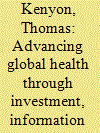

|
|
|
|
|
| Publication |
2014.
|
| Summary/Abstract |
The past decade has witnessed unprecedented levels of investment and engagement in global health spurred by the global HIV/AIDS crisis, the development of the Millennium Development Goals, momentum in polio eradication, and global outbreaks of infectious diseases such as SARS with its US$40 billion cost to society. Characterized by a sense of urgency, pragmatism, and opportunity, global health services and public health systems are being advanced to respond to rapidly expanding demands with dramatic results. However, much more remains to be done. After a decade in emergency mode, the next phase of global health work requires an even more precise approach and smarter investments. Many "donor" nations and organizations have tightened their belts in response to the recent economic downturn, while at the same time increasing the numbers of "recipient" countries, and are now better able to invest more of their own resources to benefit and protect their own citizens. In this climate, global health investments in programs and innovations must be better targeted and better informed by strategic information more than four-fold from US $6.7 billion in 1993 to US $28.4 billion in 2011. Accompanying this investment was a striking decline in mortality in children under five years of age from 12.6 million deaths in 1990 to 6.6 deaths million in 2012. Improvements in health are not the only positive outcome of these investments. The same Commission concluded that global health is a smart investment - for every dollar invested in health, it can be expected that there will be a 10-20 fold return in economic benefit to society. Healthier people are more productive and contribute back to the economy. Healthier people also lower health care costs, naturally, by requiring less care.
|
|
|
|
|
|
|
|
|
|
|
|
|
|
|
|
| 2 |
ID:
132541
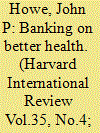

|
|
|
|
|
| Publication |
2014.
|
| Summary/Abstract |
HIV is no longer a death sentence" - that hopeful declaration-which would have been unthinkable even a decade ago- has now become a cliché by repetition whenever experts, physicians, academics and journalists gather to chart progress in fighting the disease and to set goals for the future. But for many people, sadly, that statement is not actually true. There remains no cure for the disease, and not everyone can get access to the anti-retrovirals (ARVs) that have done so much to help so many. This reflects the painful truth that poverty remains a major impediment to good health in the developing and even the developed world.
|
|
|
|
|
|
|
|
|
|
|
|
|
|
|
|
| 3 |
ID:
119389
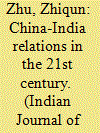

|
|
|
| 4 |
ID:
096169
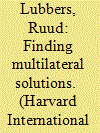

|
|
|
| 5 |
ID:
134052
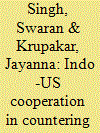

|
|
|
|
|
| Publication |
2014.
|
| Summary/Abstract |
The increasing dependence on Information and Communication Technologies (ICTs) has unleashed a whole new genre of cyber terrorism. Cyber attacks on critical infrastructure, online hate propaganda and use of the internet for recruiting, planning and effecting terrorist attacks have become new frontiers of terrorism. The ubiquitous cyberspace has expanded terrorism structures and transformed their operations. Given their democratic traditions of privileging basic freedoms, such as individual privacy, and the unprecedented spread of the internet, India and the US face a formidable challenge in confronting cyber terrorism. While both countries share a strong political affinity to cooperate and have set up institutional mechanisms to secure cyberspace, divergences in their approaches and a lack of clarity and consensus on their immediate and long-term goals continue to be their fundamental limitations. In spite of their strong commitment to work together, their divergent approaches to internet governance and episodes like the WikiLeaks and Snowden affairs have only re-enforced their continuing trust deficit.
|
|
|
|
|
|
|
|
|
|
|
|
|
|
|
|
| 6 |
ID:
129375
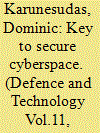

|
|
|
|
|
| Publication |
2012.
|
| Summary/Abstract |
Securing cyberspace is a global challenge one that cannot be solved by a single enterprises or country alone, though this can be achieved by bringing together government and corporate partners to protect the digital infrastructure. Cyberspace as an independent theatre of war is about attacks that compromise the capability to use these facilities: they cannot be prevented by the security services in isolation.
|
|
|
|
|
|
|
|
|
|
|
|
|
|
|
|
| 7 |
ID:
121649
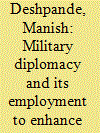

|
|
|
| 8 |
ID:
103310
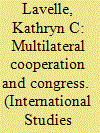

|
|
|
|
|
| Publication |
2011.
|
| Summary/Abstract |
International relations has demonstrated the contribution national legislatures make toward global cooperation. Yet what explains variation in securing funding for International Organizations (IOs) through the US Congress? I derive a theory of interaction from studies of interest groups in American politics and argue that the cause of funding delays and their resolution can be found where groups advance policy reform agendas through Congressional channels. Using process tracing of successive case studies, the article presents evidence from International Development Association (IDA) replenishments. It situates the rationality of members of Congress and other national and transnational actors within the context of a formal, domestic political institution whose budgetary process is deeply conflicted and subject to constant change. Thus, the theory offered here could be used by either rationalists or constructivists to support a material or ideational explanation for Congressional action.
|
|
|
|
|
|
|
|
|
|
|
|
|
|
|
|
| 9 |
ID:
118954
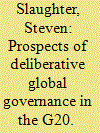

|
|
|
|
|
| Publication |
2013.
|
| Summary/Abstract |
This article contends that the 'G' system struggles to play a legitimate and effective role in global governance and argues that the G20 could play a important role if the forum was more publically accountable. This article argues that because of increasing forms of public contestation, the broadening agenda of the G8 and G20 and the uncertain status of global cooperation, that the legitimacy of the 'G' system is being questioned. As such, it is appropriate to consider deliberative avenues whereby public views could be considered by the G20 in a systematic way to foster forms of accountability. This consideration is animated by deliberative democracy theory and republican theory which advance a normative agenda which seeks to transform governance structures by enhancing the role of deliberation and public reasoning in political life. The article outlines the development of the 'G' system's legitimacy, considers possible modes of accountability and public involvement with respect to the G20 and examines the implications of more formalised public deliberation with respect to the G20.
|
|
|
|
|
|
|
|
|
|
|
|
|
|
|
|
| 10 |
ID:
186229
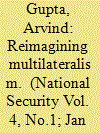

|
|
|
| 11 |
ID:
139727
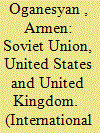

|
|
|
|
|
| Summary/Abstract |
THE TITLE needs a question mark. Indeed, did the Big Three halt a step away from global cooperation? How many mines were laid under the alliance and partnership and when? Natalia Narochnitskaia once said that "Yalta and counter-Yalta were born together."
|
|
|
|
|
|
|
|
|
|
|
|
|
|
|
|
| 12 |
ID:
129231
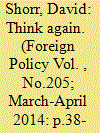

|
|
|
|
|
| Publication |
2014.
|
| Summary/Abstract |
An Ironclad Treaty Is the Only Way to Save the Planet. Don't count on it. Time is running short for the international community to tackle climate change. Pressure to act comes from rising temperatures and sea levels, superstorms, brutal droughts, and diminishing food crops. It also comes from fears that these problems are going to get worse. Modern economies have already boosted the concentration of carbon dioxide (CO2) in the atmosphere by 40 percent since the Industrial Revolution. If the world stays on its current course, CO2 levels could double by century's end, potentially raising global temperatures several more degrees. (The last time the planet's CO2 levels were so high was 15 million years ago, when temperatures were 5 to 10 degrees Fahrenheit higher than they are today.) Another source of pressure, however, is self-imposed. Under the auspices of the United Nations, the next global climate treaty -- to be negotiated among some 200 countries, with the central goal of cutting greenhouse gas emissions -- should be enacted in 2015, to replace the now-outmoded 1997 Kyoto Protocol. (Once passed by state parties, the new treaty would actually go into effect in 2020.)
|
|
|
|
|
|
|
|
|
|
|
|
|
|
|
|
|
|
|
|
|